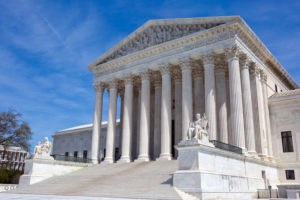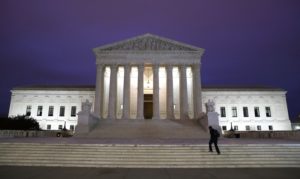
FDA authorizes use of vaccine boosters for dominant strains of COVID-19, FCC authorizes new broadband deployments to rural areas, and more…
IN THE NEWS
- The U.S. Food and Drug Administration (FDA) amended its emergency use authorizations of the Moderna and Pfizer-BioNTech COVID-19 vaccines to permit the use of updated vaccines that target the now dominant BA.4 and BA.5 Omicron variants. The Centers for Disease Control and Prevention’s (CDC) vaccine advisory group recommended the vaccines after FDA’s announcement. The recommendation from the CDC allows the Biden Administration to begin offering the updated boosters around Labor Day. If the Biden Administration offers the updated boosters, FDA would no longer recommend the original vaccines as boosters for those 12 years of age and older.
- The Federal Communications Commission (FCC) authorized nearly $800 million to fund new broadband deployments in 19 states, including Illinois, Arizona, and Iowa. The new funds will allow six providers to expand wireless network services in these states. FCC Chair Jessica Rosenworcel stated that the funding will help “close the digital divide” by providing quality service to underserved areas. This latest round of funding is part of the Rural Digital Opportunity Fund, which has to date provided more than $6 billion in broadband distribution to 47 states.
- The National Labor Relations Board (NLRB) issued a decision reaffirming that employers may not, under most circumstances, restrict employees from wearing union apparel or other insignia. The NLRB held that employers can overcome that presumption if there are “special circumstances” that justify the restriction. NLRB Chairman Lauren McFarren described wearing union insignia as a “critical form of protected communication” and emphasized that the NLRB’s holding is consistent with U.S. Supreme Court precedent.
- The U.S. Department of Health and Human Services (HHS) issued a letter to the governors of all states inviting them to apply for Medicaid waivers—which allow states to use Medicaid funding to support their particular needs. The waivers would increase access to reproductive health care, including abortion, in states where those rights are being restricted. HHS and CMS offered states the opportunity to apply to use federal Medicaid funding to expand access to reproductive health care for people traveling from states where such access has been restricted. HHS Secretary Xavier Becerra and Centers for Medicare & Medicaid Services (CMS) Administrator Chiquita Brooks-LaSure noted their “obligation to ensure that individuals have access to the medical care to which they are entitled, regardless of directly conflicting state law.”
- The U.S. Federal Trade Commission (FTC) sued data broker Kochava for its handling of personal geolocation data. The FTC alleged that Kochava sold sensitive data that can be used to track people’s visits to reproductive health clinics, addiction treatment centers, shelters, and places of worship. The lawsuit came after growing concerns over data brokers’ sales of geolocation data on visits to abortion centers to third parties. The FTC emphasized that Kochava does not allow users to safeguard sensitive location data in its feed. FTC Chair Lina Khan stated that this lawsuit is part of the FTC’s efforts to ensure greater data privacy protections for consumers. The FTC commissioners voted 4-1 in favor of authorizing the action, with Commissioner Noah Joshua Phillips voting no.
- The U.S. Environmental Protection Agency (EPA) proposed a rule designating as hazardous the synthetic chemicals per- and polyfluoroalkyl substances (PFAS) that are used in industry and consumer products. EPA noted that several federal, state, and local government entities have recognized the possible health dangers associated with PFAS. Under the proposed rule, manufacturers and others releasing PFAS beyond the reportable quantity must inform federal, state, and tribal authorities, which would allow EPA to require cleanups or recover cleanup costs. Senate Majority Leader Chuck Schumer (D-NY) praised the proposal as a means of enabling communities to pursue and hold accountable manufacturers for the environmental and public health damage caused by PFAS.
- A federal appeals court let stand part of a trial court’s injunction halting implementation of a federal vaccine mandate for government contractors. The Biden-Harris Administration issued the mandate to federal government contractors and subcontractors in September 2021 as a way to safeguard workforces during the COVID-19 pandemic. In response, a federal district judge in Georgia issued a nationwide preliminary injunction of that mandate in December 2021. This week, a federal appeals court reversed part of the trial court’s decision, finding its nationwide scope too broad. However, the appeals court still held that the federal government contractors and the seven states that challenged the mandate are entitled to preliminary injunction against the implementation of the mandate, pending further judicial proceedings.
- The Biden-Harris Administration issued a statement from the White House announcing further commitments to support American schools and address teacher and school staff shortages as the new school year begins. These commitments aim to build upon the $130 billion already allocated to K-12 schools in President Joseph R. Biden’s American Rescue Plan. In conjunction with the White House statement, private sector employment platforms ZipRecruiter, Indeed, and Handshake have all announced initiatives to promote employment opportunities in American schools. In addition, U.S. Secretary of Labor, Martin J. Walsh, and U.S. Secretary of Education, Miguel A. Cardona, issued a joint letter calling on states to further invest in solving staffing shortages, such as by increasing teacher pay, establishing and expanding teacher preparation and apprenticeship programs, and increasing collaboration across workforce and education systems.
WHAT WE’RE READING THIS WEEK
- In a working paper issued by the National Bureau of Economic Research, Ariel Kalil, a professor at the University of Chicago Harris School of Public Policy, and several coauthors, investigated the effects of welfare reforms in the United States on the quality of home environments for preschool-aged children in single-mother households. The study focused on the impacts of work support reforms that increased the employment rates of single mothers and placed higher burdens on mothers’ incomes as these mothers were able to rely on their own earned income instead of the cash assistance welfare provided. The study’s results suggested that, although these welfare reforms did not affect some indicators of early childhood success, like the amount of time or material resources mothers devoted to supporting their children’s cognitive skills, it had significant negative effects on another indicator: the mothers’ provision of emotional support. The coauthors urged policymakers to keep these results in mind when proposing policies that tie program benefits to employment in the future.
- In an article in the Journal of Free Speech Law, Christopher Yoo, a professor at the University of Pennsylvania Law School, discussed the ongoing debate over the extent to which businesses designated as common carriers and public accommodations must permit people’s speech. Yoo explained that the law permits an actor, such as social media platforms and internet service providers, to be characterized as a common carrier generally when it has significant market power, affects the public interest, is part of the regulated transportation or communications industry, receives certain “government favors” including immunity from lawsuits, or holds itself out as serving the entire public. Yoo noted that public accommodations, which have evolved to be largely defined by statute, share many of the same contours as common carriers, blurring the distinction between the two. Yoo argued that actors that exercise editorial discretion are not holding themselves out to the public, and that even if they are nonetheless regarded as common carriers or public accommodations, this exercise of editorial discretion is still entitled to First Amendment protection.
- In an article in the Minnesota Law Review, Christina Koningisor, associate professor at the University of Utah S. J. Quinney School of Law, described grassroots efforts to access and disseminate government information. These efforts, which Koningisor described as “public undersight,” have appeared across the country in recent years, leading activists to rely on public and extralegal sources of information to monitor government actions. As examples of public undersight, Koningisor detailed a series of independent efforts to monitor toxic chemicals in the air around industrial sites, resulting from frustrations with federal and state programs. Koningisor examined the drawbacks of public undersight, including its sustainability outside of large, urban areas, and she suggested improvements to mitigate the costs and risks that grassroots actors assume.
EDITOR’S CHOICE
- In an essay in The Regulatory Review, Anita L. Allen, a professor at the University of Pennsylvania Law School, considered state-sponsored privacy measures that could benefit individuals over the long term. Allen suggested that, although governments should not go so far in mandating privacy measures that would oppress people, there may sometimes be benefits to “unpopular privacy” measures in terms of helping affirm individuals’ human worth. Allen defined unpopular privacy as measures of privacy disliked by those who are constrained by such measures. Addressing concerns that some unpopular privacy measures might amount to paternalism, Allen suggested that society “think of information and physical privacies as among the ‘foundational’ human goods that make us better equipped for life in a free society.”



